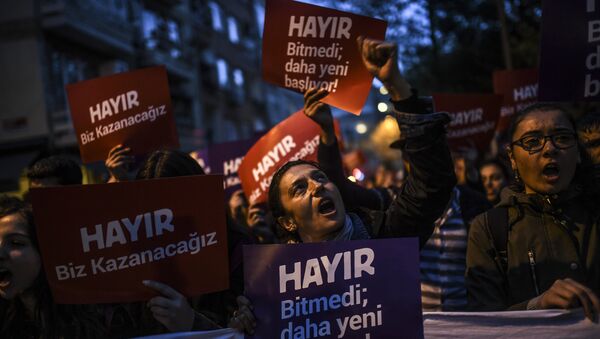According to media reports, about 1,000 protesters have gathered in Istanbul's Besiktas neighborhood and another 2,000 demonstrated in the city's Kadikoy district, while Turkey's National Security Council decided on Monday to extend the nine-month state of emergency by another three months. Smaller protests were held in other cities, including Antalya and Izmir, where over 20 people were detained.
The preliminary results among Turks living in the country showed 51.18 percent voting in favor and 48.82 against constitutional reforms for the creation of a presidential system of government. The greatest level of support was revealed to be in Turkey's central provinces, whereas the least amount of support was found in European part of Turkey, as well as the Aegean Sea coast and the Kurdish-dominated areas. Support among Turkish nationals living abroad was much higher and stands 59.09 percent.
Some Turkish officials said that they had expected to get much more support in favor of the constitutional amendments during the referendum, while the Turkish opposition outlined plans to appeal the results of the referendum with the country's constitutional court or the European Court of Human Rights (ECHR) if needed.
The amendments to the constitution proposed at the referendum will allow the Turkish president to stay as the head of the political party he or she represents, which is not permitted under current legislation. The amendments also allow Erdogan to hold the office for two more terms until 2029. The president will also have the ability to appoint vice presidents, ministers and other high ranking officials, while the post of the prime minister will be removed. The parliament, which will increase its seats by 50 to consist of 600 members, will lose the direct control of government activities, as the amendments cancel obligatory reports of the ministers before the lawmakers.
Never miss a story again — sign up to our Telegram channel and we'll keep you up to speed!



